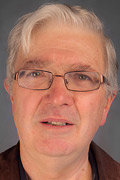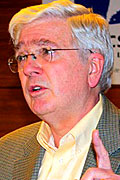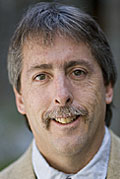The emergence of human rights as an influencing factor in international relations and the role Latin America played in that process will be examined in the second installment of Lawrence University’s month-long series “Engaging Human Rights.”

Alexander Wilde, a 1962 Lawrence graduate and a senior scholar at the Woodrow Wilson International Center for Scholars in Washington, D.C., presents “The Churches and Human Rights in Latin America” Tuesday, Oct. 11 at 7 p.m. in the Wriston Art Center auditorium. The event is free and open to the public.
Although human rights are founded in international law, Wilde will discuss how Christian beliefs and institutions contributed significantly to social movements that made the cause of human rights effective and how understanding why Latin American Christians were moved to action hold insights for engaging human rights today.
Wilde is spending the fall term as Lawrence’s distinguished visiting Scarff professor. During his career, he has directed the Washington Office on Latin America, an NGO concerned with human rights and U.S. foreign policy, and was an officer of the Ford Foundation. In the mid-1990s, he led the Ford Foundation’s regional office in Santiago, Chile, developing new programming in human rights and historical memory.
In addition to his position at the Woodrow Wilson International Center for Scholars, Wilde serves on advisory boards at the Social Science Research Council, Chilean Millennium Science Initiative and the Latin American Program of the Woodrow Wilson Center.
In recent years he has advised Argentine human rights organizations and award-winning documentary films, including “State of Fear” (2005) on the work of the Peruvian Truth Commission, “The Judge and the General” (2008) on efforts to prosecute Pinochet, “The Reckoning” (2009) on the International Criminal Court, and “Granito” (2011) on the Guatemalan genocide. He lived and worked in Chile for more than a decade during its long post-1990 transition to democracy.
Founded in 1847, Lawrence University uniquely integrates a college of liberal arts and sciences with a world-class conservatory of music, both devoted exclusively to undergraduate education. Ranked among America’s best colleges, it was selected for inclusion in the book “Colleges That Change Lives: 40 Schools That Will Change the Way You Think About College.” Individualized learning, the development of multiple interests and community engagement are central to the Lawrence experience. Lawrence draws its 1,520 students from 44 states and 56 countries.

